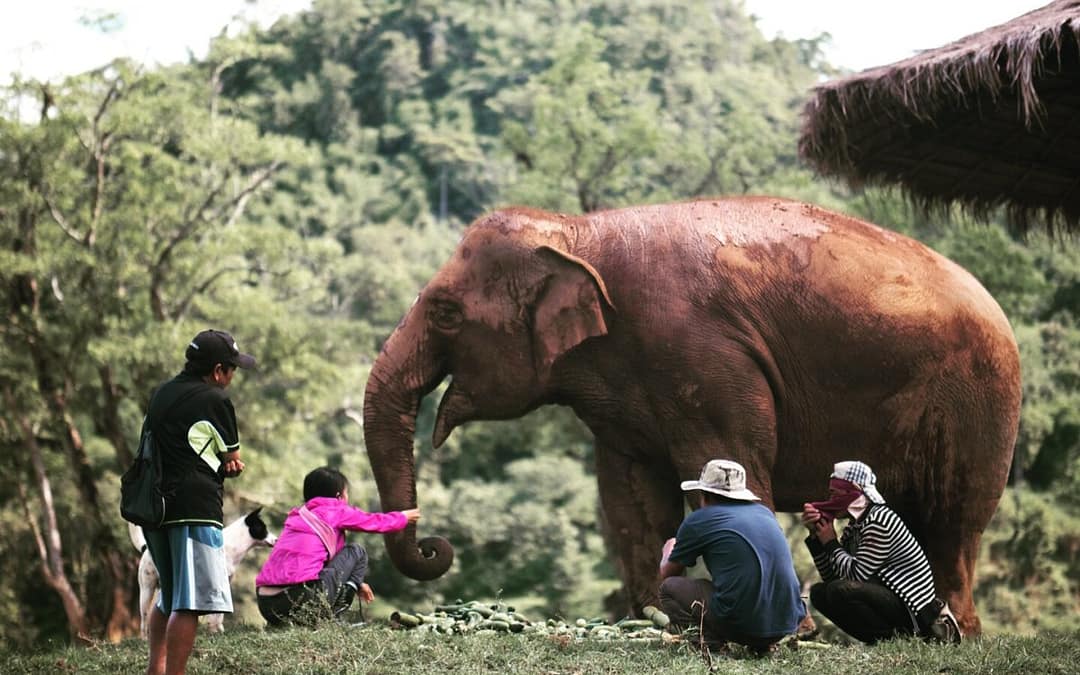One thing I love about elephants is the positive energy that I receive from them. They forgive. They never forget but they forgive.
Her real name is Sangduen, but for her whole life she has been called “Lek,” Thai slang meaning “tiny.” Upon meeting her, it seems that the name could not fit more perfectly––her thin, five-foot frame makes her appear fragile at first glance. But follow this tiny woman into an open field of 2,000-pound free roaming elephants and she is transformed into one of the giants.The way the elephants move around Lek is hypnotizing. They bring her into their space, their herd as one of their own. She addresses each one by name as they speak to one another in separate languages with complete understanding. When they get naughty and push her jealously away from the crowds with their trunks, she laughs and scolds them affectionately, like a mother. She sits beneath their bellies and hugs their strong legs while she sings to them in Thai, and in turn they harmonize above her with deep belly rumbles. It’s only in this moment of watching them come alive that you realize you’ve probably never seen a real, happy elephant.
The few of us that have been close enough to see them in zoos, circuses, or even ridden on them for elephant trekking, have only seen what Lek calls “zombies,” or the spiritless shell of an elephant. In order to control an animal of this size and train them to pull logs or carry tourists, most young elephants must be torn from their mothers at a young age and go through “phajaan” or “the crush,” a torturous ritual involving restraining, torturing, frightening, and starving that is meant to divorce an elephant from her will to live. After the ritual is complete, she will be forever deprived of a natural life with a family, taking orders from their masters and working as a slave for human industries.
Lek Chailert first witnessed this when she was 16 years old and came upon elephants doing hard labor at a logging operation in the mountains. She had always loved animals and seeing this awoke a fierce resolve to fight to change the world for them. Ever since that day, Lek has devoted her life to rescuing working elephants by investigating their industries, forming relationships with owners, educating tourists, and, since 1996, providing a refuge to over 200 rescued elephants in a place known today as Elephant Nature Park. Although they now live in peace, many still bear the injuries sustained from years of hard work, such as dislocated hips, blindness, bowed spines, and feet destroyed by land mines. Each year, thousands of tourists come to visit these rescues at the park, looking for an elephant interaction not based on exploitation, and leave educated about the realities of those that are.
This rescue model is challenging the traditions of Thai tourism and transforming the industry into a force of good for the environment, animals, and people. Lek employs former mahouts (elephant trainer) from the industries she’s working to end, such as logging or riding camps. In addition to the elephants, the sanctuary is also home to a herd of rescued buffalo, pigs, cows, birds, cats, and over 400 dogs rescued from the Bangkok floods, the dog meat trade, or life threatening injuries in the streets. And even beyond the sanctuary gates, the trees of the surrounding jungle stand tall today because of Lek’s orange Buddhist scarves wrapped around their bases, making them sacred and untouchable by loggers and developers. Actions like these which directly contradict many other, more powerful, industries in Thailand have not been without consequence. Lek lives with the knowledge that there are those actively fighting to ruin her and the sanctuary, and worse, with the memory of the times there have been attempts on her life. And yet every day, she keeps going.


